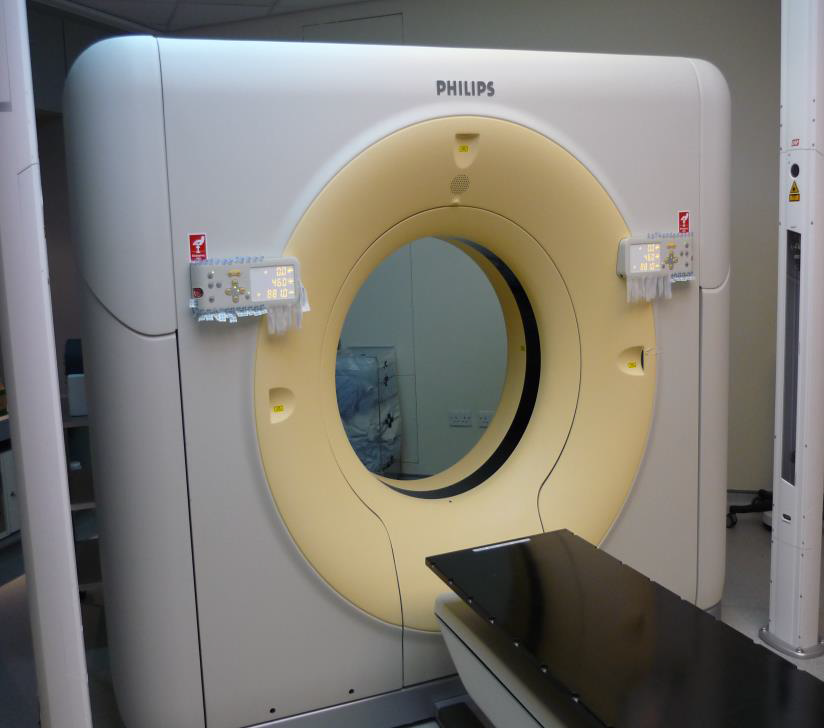- Reference Number: HEY-066/2020
- Departments: Radiotherapy
- Last Updated: 31 March 2020
Introduction
This leaflet has been produced to give you general information about your radiotherapy (CT) Computed Tomography planning at Castle Hill Hospital.
Most of your questions should be answered by this leaflet. It is not intended to replace the discussion between you and the healthcare team, but may act as a starting point for discussion. If after reading it you have any concerns or require further explanation, please discuss this with a member of the healthcare team.
It contains some general information about radiotherapy and what to expect during your first few appointments. You will receive more detailed information about your individual treatment in further leaflets and in discussion with your healthcare professionals.
Radiotherapy is a very specialist treatment and many patients need to travel long distances to receive this treatment and the expert care required. The department consists of many healthcare professionals with dedicated roles, which will be discussed further in this leaflet.
Within the Queen’s Centre there is a Health Centre that offers various support services, including relaxation techniques and more practical advice about your diagnosis and treatment. There is also a Chemotherapy Day Unit, outpatient clinics and five wards. In addition, there is a café serving small meals, snacks and refreshments; a small Boots pharmacy shop and vending machines for drinks and snacks. The main hospital has a canteen for larger meals.
What is Computed Tomography?
Computed Tomography is sometimes called a CAT or CT scan. The scanner uses X-rays to take a series of very detailed pictures of sections of the body. The X-rays pass through the body and are detected by sensors on the other side of the machine. This information then goes to a computer that produces a picture of the structures of the inside of your body.
CT planning appointment
Most radiotherapy treatments are planned using a CT scan. In order to do the planning, you will need to have a CT scan undertaken in our department, even if you have had other CT scans recently. This scan is used by the doctor to plan your individual treatment, using the information from the CT scan, making it as accurate as possible.
When you attend for this appointment, one of the Therapeutic Radiographers will explain what you should expect during your scanning appointment and any further appointments. They will also discuss the treatment side effects you may experience and how best to manage these. This is a good opportunity to ask any questions you may have about any part of your treatment or planning. If you bring anyone with you for this appointment, they will be given the opportunity to be present for this discussion; however they will not be able to accompany you into the actual scanner.

Figure 1: CT scanner.
The CT scanner (Figure 1) is shaped like a doughnut measuring approx 3 feet wide and about 10 inches deep. The bed you are laid on will pass through the hole a few times during your scan and you will hear a noise similar to that of a washing machine. The scans are generally very quick; however the length of an appointment can be longer than this, depending upon which area of the body is being scanned and the successful completion of any patient preparation that may be required. This is discussed further on in this leaflet.
The part of your body that is to be scanned will need to be exposed and we will endeavour to maintain your dignity as best we can. You may be offered a gown to wear, depending upon the area to be scanned.
During this appointment, pen marks may be drawn onto your skin by the radiographers and some sticky markers that show up on the scan may also be placed on to your skin. Most of this appointment will be spent ensuring that you are in the correct position for the scan. This will be the same position that you will be in for your treatment, so it is important you let us know if you are uncomfortable or feel that you will not be able to hold this position for any length of time.
The radiographers and sometimes other members of the treatment team e.g. doctor and a physicist may be in the room while you are being positioned, however they will all need to leave the room whilst the scanner is switched on.
CT scan preparation
Generally there is no special preparation required for CT scans and you may eat, drink and take any medication as normal.
However, in certain circumstances, depending upon the area for scanning and treatment, this may vary; if you are having your pelvis treated you may need to have your bladder full and your bowel empty. This does not mean missing meals – please eat regularly. If we are scanning your Stomach, Oesophagus or Pancreas, you may be asked to fast for two hours and then drink 200ml (one full cup) of water before it.
Any preparation required will have been explained by the doctor before you attend for your scan.
Some patients may need to have an injection before the scan. The injection contains a contrast medium, which is like a dye and helps to show up some of the organs in your body better. If you need to have this injection, a needle will be placed into your arm or hand; the injection will be given through this once you are on the CT couch. The injection should not cause you any problems but it can create a warm sensation through your body and a metallic like taste for a few minutes. It is important that you inform staff prior to attending the appointment if you suffer from any allergies, are diabetic and taking Metformin, have any heart conditions or suffer from asthma. It is also important that you let staff know if you have had a previous allergic reaction to any scan injection. A member of staff will attempt to contact you by telephone prior to your appointment to discuss these points.
Female patients aged between 12 and 55 years of age will be asked if they are or might be pregnant. If at any point during your radiotherapy treatment you suspect that you may possibly be pregnant, you must inform your treatment team immediately.
Additional information
You will be offered other leaflets that have more specific information about the area you will be having treated. There are also further leaflets available about our Health Centre and other services offered by the Queen’s Centre.
Should you require further advice on the issues contained in this leaflet, please do not hesitate to contact the Radiotherapy Department or the Radiotherapy Information and Support Team on telephone number (01482) 461206, or email: hyp-tr.radiotherapy.information@nhs.net
Useful contacts
Please note below contact details of useful organisations that provide information about cancer including radiotherapy treatments:
Macmillan Cancer Support
Provide information from specialist nurses on all aspects of cancer and its treatment and on the practical and emotional aspects of living with cancer.
You can drop into the Macmillan Cancer Information Centre within the Queens Centre or contact them on: (01482) 461154 Mon-Fri, 9.00am-5.00pm, excluding weekends and Bank Holidays.
Alternatively free phone the national help line: 0808 808 0000 Mon-Fri 9.00am -8.00pm
Online: http://www.macmillan.org.uk
Write to Macmillan Cancer Support, 89 Albert Embankment, London, SE1 7UQ
General Advice and Consent
Most of your questions should have been answered by this leaflet, but remember that this is only a starting point for discussion with the healthcare team.
Consent to treatment
Before any doctor, nurse or therapist examines or treats you, they must seek your consent or permission. In order to make a decision, you need to have information from health professionals about the treatment or investigation which is being offered to you. You should always ask them more questions if you do not understand or if you want more information.
The information you receive should be about your condition, the alternatives available to you, and whether it carries risks as well as the benefits. What is important is that your consent is genuine or valid. That means:
- you must be able to give your consent
- you must be given enough information to enable you to make a decision
- you must be acting under your own free will and not under the strong influence of another person
Information about you
We collect and use your information to provide you with care and treatment. As part of your care, information about you will be shared between members of a healthcare team, some of whom you may not meet. Your information may also be used to help train staff, to check the quality of our care, to manage and plan the health service, and to help with research. Wherever possible we use anonymous data.
We may pass on relevant information to other health organisations that provide you with care. All information is treated as strictly confidential and is not given to anyone who does not need it. If you have any concerns please ask your doctor, or the person caring for you.
Under the General Data Protection Regulation and the Data Protection Act 2018 we are responsible for maintaining the confidentiality of any information we hold about you. For further information visit the following page: Confidential Information about You.
If you or your carer needs information about your health and wellbeing and about your care and treatment in a different format, such as large print, braille or audio, due to disability, impairment or sensory loss, please advise a member of staff and this can be arranged.

